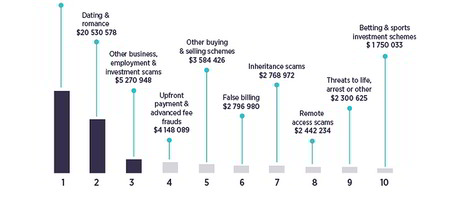Australians lost $340m to scammers in 2017

Australians lost a record $340 million to scammers in 2017, with more than 200,000 scam reports to government agencies throughout the year, according to the ACCC.
The total losses for the year were the highest in the nine years since the regulator began reporting on scam activity, and 2017 was the first time reported losses to scams have totalled more than $300 million, the ACCC’s latest Targeted Scams report shows.
Based on just the reports filed with the ACCC’s Scamwatch service — accounting for 161,528 reports and $90.9 million of the total losses — investment scams were responsible for the highest losses in 2017 at over $31 million. This represents a 33% increase over reported losses in 2016.
Dating and romance scams ($20.5 million), business and employment scams ($5.3 million), upfront payment or advanced fee frauds ($4.2 million) and buying and selling schemes ($3.6 million) rounded out the top five.
Scams involving impersonating well-known government organisations or businesses were reported 33,000 times and were to blame for $4.7 million in losses. Worryingly, more than 2800 people gave their personal information to the scammers during these attacks.
People aged over 55 bore the majority of losses (52%) and were responsible for 44% of all complaints. Men meanwhile accounted for a substantial majority of losses ($51.4 million compared to $37.9 million) but significantly fewer reports than women (85,495 compared to 72,282).
“It’s very worrying that Australians are losing such extraordinary amounts to scammers. Based on just the reports provided to the ACCC, victims are losing an average of $6500. In some cases people have lost more than $1 million,” ACCC Deputy Chair Delia Rickard said.
“Some scams are becoming very sophisticated and hard to spot. Scammers use modern technology like social media to contact and deceive their victims. In the past few years, reports indicate scammers are using aggressive techniques both over the phone and online.”
She said examples of scammers spoofing well-known organisations include impersonating the ATO and threatening people with immediate arrest unless they pay an outstanding bill, or impersonating Centrelink and promising extra payments in return for a processing fee.
“Scammers scare us or butter us up with promises of cash because they know it clouds our judgement. People get so worried about being arrested they don’t question if the person threatening them is genuine,” Rickard said.
“If you’re being threatened, take a deep breath and ask yourself if the call makes sense. The ATO will never threaten you with immediate arrest; Telstra will never need to access your computer to ‘fix’ a problem; and Centrelink will never require a fee to pay money it owes you. Finally, none of these organisations will ask you to pay using iTunes gift cards.”
Please follow us and share on Twitter and Facebook. You can also subscribe for FREE to our weekly newsletter and quarterly magazine.
Cyber lessons from 2025: why human risk will define 2026
Success in 2026 will come from building security into the rhythm of business, where technology,...
2026 will be the year identity defines cyber defence
2025 gave us an initial look at what happens when AI scales faster than identity controls.
How to harness AI to advance cybersecurity
Organisations that prioritise AI-enabled security and a culture of continuous learning...



